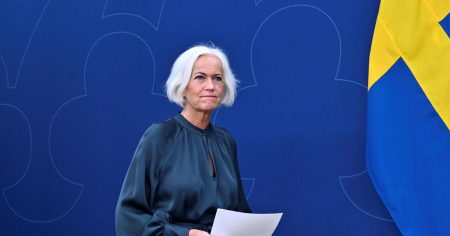The Stockholm District Court has found Salwan Najem guilty of hate speech against a group, specifically Muslims, in connection with a series of Quran burnings carried out in 2023. Najem participated in these acts alongside Salwan Momika, who has since passed away. The court’s verdict, delivered after Momika’s death, details four separate instances of hate speech and seven instances of benefit fraud, for which Najem received a probationary sentence and fines. While the court acknowledged the defendants’ stated intention to criticize the religion of Islam, it emphasized that their actions significantly exceeded the bounds of legitimate debate and criticism. The burning of the Quran, coupled with the accompanying pronouncements made by Najem and Momika, constituted deliberate expressions of contempt directed towards Muslims.
The court’s decision underscores the delicate balance between freedom of expression and the protection of individuals and groups from hateful rhetoric. While individuals have the right to express critical viewpoints regarding religion, this right is not absolute. The presiding judge, Göran Lundahl, emphasized that expressing an opinion about a religion does not grant immunity from legal consequences if the expression crosses the line into hate speech. The court’s judgment clarifies that simply expressing an opinion on religion does not provide a carte blanche to say or do anything without the risk of offending the group adhering to that belief system. This case highlights the importance of engaging in respectful and substantive discourse, even when expressing critical perspectives.
The Quran burnings, meticulously orchestrated by Momika, took place at various locations across Sweden, often chosen to maximize their provocative impact. Momika targeted areas with significant Muslim populations, such as outside Stockholm’s mosque in Södermalm and Rinkeby. These actions sparked widespread outrage and condemnation, both domestically and internationally, highlighting the complex interplay between freedom of expression, religious sensitivities, and public order. The case also underscores the challenges faced by legal systems in navigating these competing interests.
Investigations into Momika’s background revealed potential links to the Iranian regime, though he consistently denied any external influence on his actions. The connection raised questions about the motivations behind the Quran burnings and the potential involvement of foreign actors seeking to exploit societal tensions in Sweden. While Momika himself claimed sole responsibility, the allegations of external influence added another layer of complexity to an already sensitive situation.
The legal proceedings against Momika and Najem were initiated in August 2023, culminating in charges of hate speech. However, the case took an unexpected turn when Momika was shot and killed in Södertälje in late January 2024. This tragic event led to a postponement of the verdict, as the court could not legally convict a deceased individual. Momika’s death further complicated the legal proceedings and added a tragic dimension to the ongoing debate surrounding the Quran burnings.
Shortly before his death, Momika released a video message in which he defended his actions, expressing no remorse and stating his willingness to sacrifice himself for his principles. He reiterated his conviction that individuals should be prepared to die for their beliefs. This final statement underscored his unwavering commitment to his cause, even in the face of widespread condemnation and personal risk. The video served as a final testament to his beliefs and motivations, leaving a complex legacy to be interpreted in the aftermath of the controversial Quran burnings and his untimely death. The case highlights the enduring challenges associated with balancing freedom of expression with the need to prevent hate speech and protect vulnerable groups.














